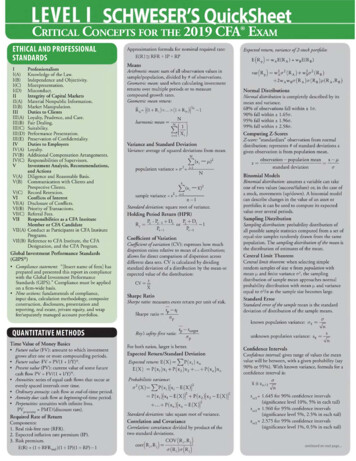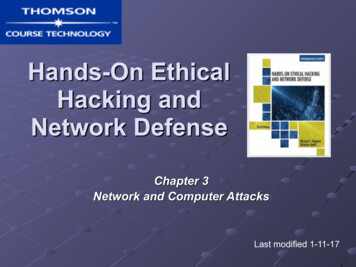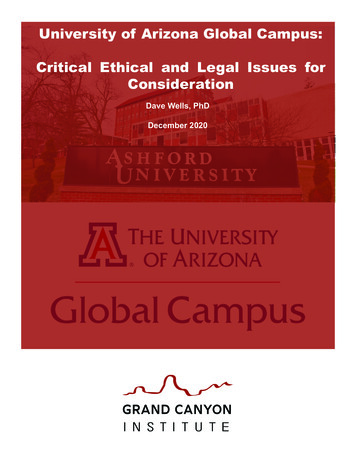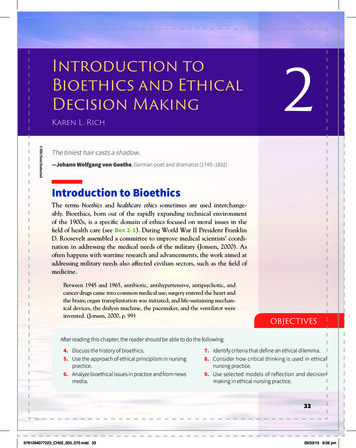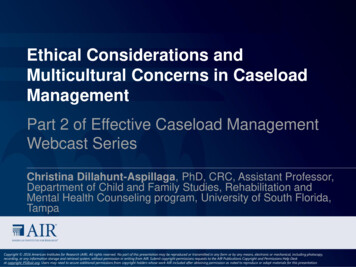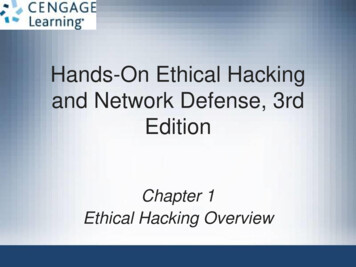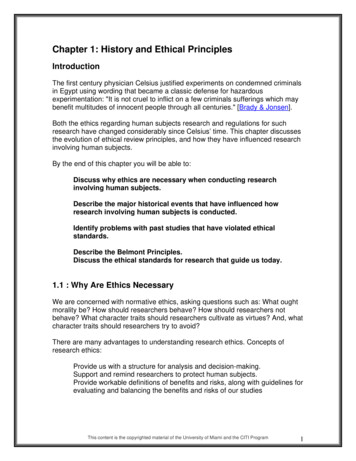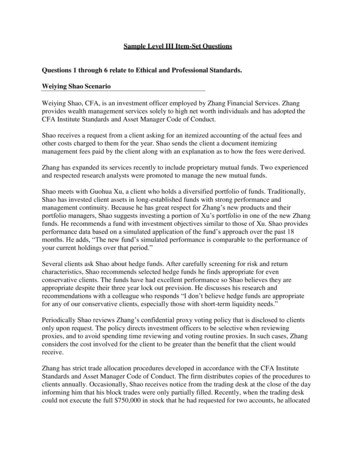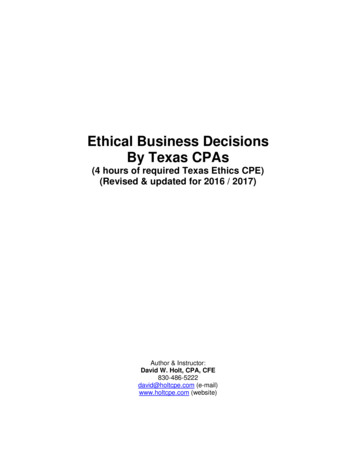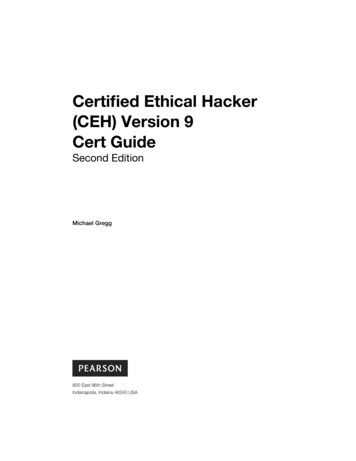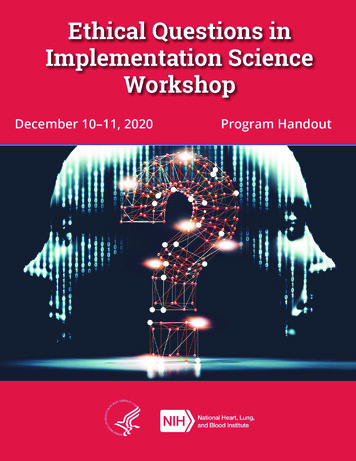
Transcription
Ethical Questions inImplementation Science WorkshopProgram HandoutCenter for Translation Researchand Implementation ScienceDecember 10–11, 2020Workshop Panelists BiographiesxJenny Blumenthal-Barby, Ph.D., MAJenny Blumenthal-Barby, Ph.D., M.A. is the Cullen Professor of Medical Ethics and AssociateDirector of the Center for Medical Ethics and Health Policy at Baylor College of Medicine.She received her Ph.D. in philosophy, with a specialization in bioethics, from Michigan StateUniversity in 2008.Dr. Blumenthal-Barby’s research focuses on medical decision-making and the ethics of the useof behavioral economics and decision psychology to shape people’s decisions and behaviors.Dr. Blumenthal-Barby has been the recipient of a prestigious Greenwall Faculty Scholar Awardin Bioethics, a Pfizer Bioethics Fellowship, and served as the Principal Investigator on threeawards from the Patient Centered Outcomes Research Institute (PCORI) to study andimprove decision making in advanced heart failure. Most recently, she received funding as aCo-Principal Investigator to study ethics and decision making in pediatric deep brain stimulation through the NIHBRAIN initiative. She has published more than 80 articles in bioethics, philosophy, and medical journals as well as servedon several expert panels and committees related to bioethics and medical decision making. She is an Associate Editor forthe Journal of Medical Ethics and is on the Board of Directors for the American Society for Bioethics and Humanities. Shehas a book forthcoming with MIT Press: Good Ethics and Bad Choices: The Relevance of Behavioral Economics for Medical Ethics.xCheryl Anne Boyce, Ph.D.Cheryl Anne Boyce, Ph.D., is the Chief of the Implementation Science Branch, Center forTranslation Research and Implementation Science (CTRIS) within the National Heart,Lung, and Blood Institute (NHLBI), National Institutes of Health (NIH), Department ofHealth and Human Services (DHHS). After doctoral studies at the University of NorthCarolina at Chapel Hill, and clinical and research fellowships at the Children’s NationalMedical Center and University of Maryland School of Medicine, she began her federal careeras a Society for Research in Child Development/American Association for the Advancementof Science (AAAS) Executive Branch Policy Fellow. She has been responsible for researchand policy collaborations across agencies on child development, developmental risk, healthtreatment, evidence-based practice, and implementation research. She has served as federalstaff for national studies on children and families and child welfare issues, including theEnvironmental Children’s Health Outcomes (ECHO) Study, Longitudinal Study of ChildAbuse and Neglect (LONGSCAN), and Federal Child Neglect Consortium. Before joining NHLBI, she held scientificleadership positions at the National Institute on Drug Abuse (NIDA) and National Institute of Mental Health (NIMH),focused on neurodevelopment, evidence-based practice, translational research, young children, drug exposures, traumaticstress, health disparities, child maltreatment, and research training. Her commitment to public health science and servicehas been recognized through awards from the Executive Office of the President, Office of National Drug Control Policy,and NIH Office of the Director. She is an expert on mentoring, career, and research training issues and is dedicated toincreasing and diversifying the biomedical research workforce. She co-edited the revised popular eBook ongrantsmanship uniquely written by both federal personnel and successful research investigators entitled, “How to write asuccessful research grant application: A guide for social and behavioral scientists” (2nd edition) (Pequegnat, Stover, & Boyce, 2011).6
Ethical Questions inImplementation Science WorkshopProgram HandoutCenter for Translation Researchand Implementation ScienceDecember 10–11, 2020xCatherine Burke, MAMs. Burke has devoted most of her thirty-three years of government service managinggrants in various capacities. From 1988-1991, she was a Program Assistant to theFulbright Scholars Program at the US Information Agency. During that time, Ms. Burkewas responsible for ensuring that the Fulbright scholars had all of the paperworkprocessed correctly and that they had everything they needed prior to arriving at theforeign institution. Additionally, she managed the foreign grants and supplementalpaperwork for the incoming scholars from Eastern Europe. In 1991, Ms. Burketransitioned to the Fogarty International Center at the NIH and continued to managegrants for a new program that enabled US scientists to collaborate with foreign scientists.These small grants provided a stipend to the foreign scientist for their collaborations onUS projects. In 1995, Ms. Burke came to the National Heart, Lung, and Blood Institute,where she has assisted program officials with all aspects of extramural grants managementand portfolio analysis. In an effort to ensure that all staff are properly trained inmanaging extramural grants, Ms. Burke designed an executed a training program for new staff, engaging multiple subjectmatter experts in the course. In addition to the day to day activities of extramural grants management, Ms. Burke hasbeen involved in several portfolio analysis projects for the Division of Cardiovascular Sciences and sits on two NHLBIportfolio analysis working groups. Ms. Burke has an undergraduate degree in Communications and a Master’s degree inCounseling.xNeal Dickert, M.D., Ph.D.Dr. Dickert is an Associate Professor of Medicine in the Division of Cardiology. He alsoholds a secondary appointment in the Department of Epidemiology at the Rollins School ofPublic Health, is a Senior Faculty Fellow at the Emory Center for Ethics, and is a memberof the Emory Clinical Cardiovascular Research Institute and the Emory Health ServicesResearch Center x.html). Dr. Dickert is a board-certified cardiologistwhose clinical work is primarily in cardiac critical care and echocardiography. He completedmedical school at the Johns Hopkins University School of Medicine and a PhD in healthpolicy and bioethics and the Johns Hopkins Bloomberg School of Public Health. Hecompleted an internal medicine residency at Johns Hopkins and a cardiology fellowship atEmory. Dr. Dickert joined the faculty at Emory in 2012 as part of the Emory ClinicalCardiovascular Research Institute.Dr. Dickert’s research focuses on ethical issues relevant to cardiology practice and clinical research. In particular, he isactively engaged in research projects addressing the conduct of clinical research in acute care contexts where informedconsent is either impossible or very difficult. Dr. Dickert is also interested in and has published work regardinginvestigators’ responsibilities to provide ancillary care to research participants, the process of shared decision-making forclinical care and research participation, and the role of incentives for research recruitment.7
Ethical Questions inImplementation Science WorkshopProgram HandoutCenter for Translation Researchand Implementation ScienceDecember 10–11, 2020xKathleen Fenton, M.D., MSAs a pediatric heart surgeon, Dr. Fenton was already working with colleagues to helpbroaden their understanding and appreciation of surgical ethics. Then, after completingMaster of Science in Bioethics, she wanted to make a more profound contribution todomestic and international health care policy, combining her unique background inmedicine, global health and bioethics. With this in mind, she started working in the GlobalHealth branch of the Center for Translation Research and Implementation Science(CTRIS) at NHLBI in mid-2019. A year and a half later, she accepted the position ofdeputy chief of the Advanced Technologies and Surgery Branch of NHLBI’s Division ofCardiovascular Sciences, where she currently works. This followed two previous excitingturning points in her career.The first was in 2006. Having had two academic positions as a surgeon in the U.S., shemoved to Managua to help establish a pediatric heart surgery program. Her intention wasto return home after two or three years, but the work was immensely rewarding. She quickly realized that she was not onlygiving life back to children who otherwise would have no access to surgery, but that by mentoring the local surgeon andmedical team she was allowing them to develop their careers in a way that would not have otherwise been possible.Meanwhile, when she was appointed to serve on the Standards and Ethics Committee for the Society of ThoracicSurgeons in 2010, it did not occur to her that it would be anything other than a short-term act of service to her colleagues.However, Dr. Fenton soon realized just how great a need there is for surgeons to be actively involved in bioethics! Thismotivated her to obtain formal training in bioethics, and she now applies this both at NHLBI and as an Affiliate Scholarin NIH’s Department of Bioethics.xGarth Graham, M.D., MPH, FACP, FACCDr. Garth Graham, M.D., MPH, FACP, FACC, is a leading authority on socialdeterminants of health and health equity. As the Vice President of Community Health forCVS Health, Dr. Graham leads the enterprise-wide community and social determinants ofhealth (SDoH) strategy, working closely with CVS Health’s many businesses, to ensuredifferentiated, measurable and scalable approaches to addressing community health incommunities across the country. Additionally, he leads public health partnerships andcardiovascular initiatives for CVS Health. Dr. Graham joined CVS Health through theAetna acquisition, where he was President of the Aetna Foundation since 2014.A cardiologist and professor of medicine, Dr. Graham is passionate about the opportunityto improve local health through cross-sector collaboration. Dr. Graham previously servedas Deputy Assistant Secretary at the U.S. Department of Health and Human Servicesunder both the Obama and Bush Administrations, where he also ran the Office of Minority Health. He directed thedevelopment of the federal government’s first National Health Disparities Plan released under the Obama administration.Dr. Graham was also the assistant dean for health policy at the University of Florida School of Medicine, where he ledseveral research initiatives looking at how to improve outcomes and readmission rates in cardiac patients in underservedpopulations.He contributes to several boards including the National Heart, Lung, and Blood Institute Advisory Council, the Instituteof Medicine Board on Population Health, Board of the National Quality Forum, the American HeartAssociation/American Stroke Associational National Quality Oversight Committee, the American College ofCardiology/American Heart Association Task Force on Clinical Data Standards, the Harvard Medical School DiversityFund (chair) and was named by the President to the U.S. Federal Coordinating Council on Comparative EffectivenessResearch many others.8
Ethical Questions inImplementation Science WorkshopProgram HandoutCenter for Translation Researchand Implementation ScienceDecember 10–11, 2020Dr. Graham has been featured in media outlets including Fortune, USA Today, The Hill, The Chicago Tribune, Essence,U.S. News & World Report, Quartz and Ebony. Dr. Graham holds a medical degree from Yale School of Medicine, anMPH from Yale School of Public Health and a bachelor of science in biology from Florida International University. Hecompleted clinical training at Massachusetts General Hospital and Johns Hopkins where he trained in cardiology andinterventional cardiology. He holds three board certifications including internal medicine, cardiology and interventionalcardiology.xSteven Joffe, M.D., MPHDr. Joffe is the Founders Professor of Medical Ethics and Health Policy at the University ofPennsylvania Perelman School of Medicine, Acting Chair of the Department of MedicalEthics and Health Policy, Chief of the Division of Medical Ethics, and Director of the PennPostdoctoral Training Program in the Ethical, Legal and Social Implications of Genomics.He is also Professor of Pediatrics at the Children’s Hospital of Philadelphia.Dr. Joffe attended Harvard College, received his MD from the University of California SanFrancisco (UCSF), and received his public health degree from UC Berkeley. He trained inpediatrics at UCSF and in pediatric hematology/oncology at the Dana-Farber CancerInstitute and Boston Children’s Hospital. His research addresses the ethical challenges thatarise in the conduct of biomedical investigation and in genomic medicine and science. He isa member of the FDA’s Pediatrics Ethics Subcommittee and the National Human GenomeResearch Institute’s Genomics and Society Working Group.xJeremy M. Kahn, M.D. MScDr. Kahn is Professor of Critical Care Medicine and Health Policy & Management at theUniversity of Pittsburgh School of Medicine and Graduate School of Public Health. Dr.Kahn’s research program focuses on the organization, management, and financing of criticalcare services in the United States. Specific areas of interest include ICU workforce andstaffing, quality measurement, benchmarking, telemedicine, and regionalization of critical andemergency care. His work integrates approaches from the fields of epidemiology, healthservices research, health economics and organizational science to investigate novel strategiesfor increasing the quality and efficiency of care for critically ill patients. In addition to hisresearch activities, he provides patient care in the ICU at Magee Women’s Hospital of UPMCin Pittsburgh.xNancy Kass, ScDNancy Kass, ScD is Vice Provost for Graduate and Professional Education, Johns HopkinsUniversity and Phoebe R. Berman Professor of Bioethics and Public Health in the JHUBerman Institute of Bioethics and Bloomberg School of Public Health, and Professor ofHealth Policy and Management. In 2009-2010, Dr. Kass was based in Geneva, Switzerland,working with the World Health Organization (WHO). Dr. Kass received her B.A. fromStanford University, completed doctoral training in health policy from the Johns HopkinsSchool of Public Health and post-doctoral training at the Kennedy Institute of Ethics,Georgetown University. As Vice-Provost, Dr. Kass focuses on the quality of PhD educationand postdoctoral training, including promoting transparency about programs, diversity of thestudent body, professional development, and mentoring. In her faculty role, Dr. Kassconducts empirical work in bioethics, public health, and human research with publicationson global and U.S. research ethics, public health ethics, and the learning healthcare system.Dr. Kass chairs the NIH All of Us Research Program Central IRB; she previously served as consultant to the President’s9
Ethical Questions inImplementation Science WorkshopProgram HandoutCenter for Translation Researchand Implementation ScienceDecember 10–11, 2020Advisory Committee on Human Radiation Experiments, the National Bioethics Advisory Commission, and the NationalAcademy of Sciences. Dr. Kass is an elected member of the National Academy of Medicine (formerly Institute ofMedicine) and an elected Fellow of the Hastings Center.xMeeta Prasad Kerlin, M.D., MSCEDr. Kerlin is Assistant Professor of Medicine and core faculty member of the Palliativeand Advanced Illness Research (PAIR) Center of the Perelman School of Medicine at theUniversity of Pennsylvania. Her primary research interests include studying andoptimizing the contribution of the ICU organization to outcomes of critical illness, with afocus on implementation science related to critical care interventions andinterprofessional care. She has led multiple secondary data analyses, randomized trials,experimental implementation studies, systematic reviews, survey studies, and qualitativestudies. She has held ongoing NIH funding since 2013, including two current R01s, oneof which funds a currently active trial of nudges to increase utilization of evidence-basedmechanical ventilation strategies.xScott Kim, M.D., Ph.D.Scott Kim is a Senior Investigator in the Department of Bioethics, National Institutes ofHealth. Prior to joining NIH, he was Professor of Psychiatry and Co-Director of the Centerfor Bioethics and Social Sciences in Medicine at the University of Michigan.Dr. Kim received his MD from Harvard and PhD in moral philosophy (on Kantian ethics)from the University of Chicago, and trained in adult psychiatry at the MassachusettsGeneral Hospital.Dr. Kim combines philosophical, clinical, and empirical research approaches to his work,using a variety of methods to address several bioethical topics, including: ethical issues inpragmatic clinical trials, assessment of decision-making capacity, surrogate consent forincapacitated patients, theory of informed consent, end of life issues (especially euthanasiaand physician-assisted suicide), and a variety of topics in research ethics.ௗDr. Kim’s work has been supported by theNIMH, NINDS, NIA, NHGRI, Michael J. Fox Foundation, American Association for Geriatric Psychiatry, and theGreenwall Foundation.ௗHis work has appeared in New England Journal of Medicine, Nature, JAMA, and other key journals.ௗHis book Evaluation of Capacity to Consent to Treatment and Research (Oxford, 2010) is available in English and Japanese.xAisha Langford, Ph.D., MPHAisha Langford, PhD, MPH, is an Assistant Professor in the Department of PopulationHealth, Division of Comparative Effectiveness and Decision Science within NYU’sGrossman School of Medicine. ௗSheௗis alsoௗan affiliate faculty member of the Division ofMedical Ethics within Population Health. UnderௗNYU Langone Health’s Clinical andTranslational Science Institute, sheௗco-directs the Recruitment and Retention Core.Broadly,ௗDr. Langford’s researchௗexplores how health communication can improveindividual decision making and reduce population health disparities for conditions orbehaviors that lead to preventable mortality and morbidity.ௗ Historically, she has donework in cancer prevention and minority clinical trial participation in community-basedsettings. Her current work has expanded to include cardiovascular disease broadly, with aparticular interest in hypertension-related decision making and patient-physiciancommunication. Dr. Langford earned her BA in English from the University of Virginia,10
Ethical Questions inImplementation Science WorkshopProgram HandoutCenter for Translation Researchand Implementation ScienceDecember 10–11, 2020MPH in Behavioral Science from Saint Louis University, and PhD in Health Behavior and Health Education from theUniversity of Michigan. Prior to transitioning to a career in academic research, Dr. Langford held professional roles inpublic relations, adult literacy, and community outreach. She is an active member of the Society for Medical DecisionMaking, Society of Behavioral Medicine, and Academy of Communication in Healthcare. She serves as an associate editorfor two journals: (1)ௗClinical Trials and (2)ௗPatient Education and Counseling.ࣟxJim Lavery, Ph.D., MScJim Lavery is the inaugural Conrad N. Hilton Chair in Global Health Ethics, Professor inthe Hubert Department of Global Health in the Rollins School of Public Health, andFaculty of the Center for Ethics, Emory University, Atlanta, Georgia. Prior to joining theEmory faculty, he was a Research Scientist and Managing Director of the Centre forEthical, Social & Cultural Risk at the Li Ka Shing Knowledge Institute of St. Michael’sHospital, and an Associate Professor in the Dalla Lana School of Public Health, Instituteof Medical Science, and Joint Centre for Bioethics at the University of Toronto.Jim received M.Sc. and Ph.D. degrees from the Institute of Medical Science and Centrefor Bioethics at the University of Toronto and held a post-doctoral fellowship in appliedethics and health policy at the Queen’s University Health Policy Research Unit, fundedjointly by the Social Sciences and Humanities Research Council and the CanadianFoundation for Health Services Research. He then spent 3 years at the Fogarty International Center, and Warren G.Magnuson Clinical Center Department of Clinical Bioethics, at the National Institutes of Health in Bethesda, Maryland,where he worked on U.S. federal government policy on the regulation of federally-funded research outside the UnitedStates.Jim was the co-principal investigator of the Ethical, Social and Cultural (ESC) Program for the Bill & Melinda GatesFoundation’s Global Health and Global Development programs from 2005-2015. He is currently leading the developmentof the Human Engagement Learning Platform (HELP) for Global Health at Emory University, to support funders andimplementation partners to improve community and stakeholder engagement and organizational learning in global healthand global development programs. He is the 2017 recipient of the Global Forum for Bioethics in Research Award forContributions to Progress in International Research. He is a member of the Board of Directors of the Council for HealthResearch for Development (COHRED) USA, a member of the Scientific and Technical Advisory Committee of theHealth Campaign Effectiveness Coalition at the Task Force for Global Health, and a member of the Bioethics AdvisoryPanel of Pfizer, Inc.xDaniel D. Matlock, M.D., MPHDr. Matlock is an Associate Professor of Medicine, Division of Geriatrics at University ofColorado, and the Director of the Colorado Program for Patient Centered Decisions atACCORDS (The Adult and Child Consortium for Outcomes Research and DeliveryScience). He is board certified in Internal Medicine, Geriatrics, and Palliative care. Hisresearch is aimed at fundamentally changing and improving how patients make decisionsaround invasive cardiovascular technologies. He is currently the PI for a PCORI projectimplementation a decision aid for left ventricular assist devices to all programs in the UnitedStates.11
Ethical Questions inImplementation Science WorkshopProgram HandoutCenter for Translation Researchand Implementation ScienceDecember 10–11, 2020xGeorge Mensah, M.D., FACCDr. George Mensah is a clinician-scientist who currently serves as the Director of theCenter for Translation Research and Implementation Science at the National Heart,Lung, and Blood Institute (NHLBI), a part of the National Institutes of Health (NIH).In this role, Dr. Mensah leads a trans-NHLBI effort to advance late-stage translationalresearch and implementation science to address gaps in the detection, prevention,treatment, and control of heart, lung, and blood diseases and sleep disorders, and theelimination of related health inequities. His goal is to maximize the health impact ofadvances made in fundamental discoveries, clinical and translational research, andpopulation science research. Dr. Mensah is an honors graduate of Harvard University.He obtained his medical degree from Washington University and trained in InternalMedicine and Cardiology at Cornell. His professional experience includes more than 20years of public health service at the U.S. Department of Veterans Affairs, the Centers forDisease Control and Prevention (CDC), and the NIH. In addition to his public service, Dr. Mensah had 15 years ofexperience in direct patient care, teaching, and research at Cornell, Vanderbilt, and the Medical College of Georgia (MCG).He was a full professor with tenure at MCG and is currently a Visiting Full Professor at the University of Cape Town,South Africa. Dr. Mensah has been admitted to fellowships in several national and international societies including theAmerican Heart Association, American College of Cardiology, and the European Society of Cardiology. He is anHonorary Fellow of the College of Physicians of South Africa and a Life Member of the Association of BlackCardiologists. He maintains active collaboration with several international groups to advance research on the globalburden of diseases and risk factors.xxJoseph Millum, Ph.D.Joseph Millum is a bioethicist with the Clinical Center Department of Bioethics and theFogarty International Center at the US National Institutes of Health. He studied philosophy atEdinburgh University and the University of Toronto, where he received his doctorate, andeconomics at Johns Hopkins University. His research focuses on the rights and responsibilitiesof parents, the ethics of international research, informed consent, and priority setting forhealth care and research. He is author of the monograph The Moral Foundations of Parenthood(2018), and co-editor of Global Justice and Bioethics (2012) and Global Health Priority-Setting: BeyondCost-Effectiveness (2019).Mollie Minear, Ph.D.Dr, Minear is a Program Officer in the Division of Cardiovascular Sciences at the NationalHeart, Lung, and Blood Institute (NHLBI) of the NIH. She has a Ph.D. in genetics andgenomics, and postdoctoral training in the ethical, legal, and social implications (ELSI) ofgenetics. Mollie came to the NIH as an American Association for the Advancement ofScience (AAAS) Science & Technology Policy Fellow, where she worked in the NHLBI’sEpidemiology Branch to address questions about the return of genetic results toparticipants in longitudinal cohort studies. She works with the NHLBI’s Trans-Omics forPrecision Medicine (TOPMed) program, where she is the staff lead for ELSI topics likeinformed consent and genomic data sharing. Mollie is interested in facilitating the ethicaltranslation of genomics into clinical practice and developing a better understanding of thepersonal use and clinical utility of genomic information.12
Ethical Questions inImplementation Science WorkshopProgram HandoutCenter for Translation Researchand Implementation ScienceDecember 10–11, 2020xLora Reineck, M.D., MSDr. Lora Reineck joined NHLBI in 2014 and is the Acute Lung Injury/Critical CareProgram Director in the Division of Lung Diseases. She is a pulmonary and critical carephysician with expertise in health services and clinical research. Dr. Reineck completedmedical school at Johns Hopkins University, internal medicine residency at the University ofMichigan, and pulmonary and critical care fellowship at the University of Pittsburgh.xRebecca Roper, M.S., M.P.H.Rebecca Roper, M.S., M.P.H., serves as a Project Officer in the Implementation ScienceBranch in the NHLBI’s Center for Implementation Science (CTRIS). Prior to joining CTRISin 2017, Ms. Roper Directed the Primary Care Practice-Based Research Network (PBRN)Initiative at the Agency for Healthcare Policy and Research (AHRQ). The registered PBRNcommunity burgeoned in numbers and types of PBRNs, both domestically and internationally,during her tenure. Areas of technical expertise include the use of health informationtechnology (Health IT) for quality measurement and quality improvement; implementationresearch for the enhanced prevention and treatment of chronic conditions; development andassessment of practice-setting-informed implementation research; community engagement forhealth improvement; epidemiology; development of professional society-approved trainingmaterials (e.g., maintenance of certification and clinical medical education) for clinicianresearchers; and, the production of award-winning videos showcasing impact of late-stageimplementation research. Ms. Roper received a B.S. in Health Services Administration from Providence College, a dualM.S. in Biostatistics and Epidemiology from Georgetown University, and an M.P.H. in Health Policy and Administrationfrom the University of North Carolina at Chapel Hill---during their respective March-Madness glory days.xDonna Spiegelman, ScDDr. Spiegelman is an expert in statistical methods in epidemiology, clinical, and public healthresearch. Dr. Spiegelman has nearly 30 years of experience in the design and conduct ofrandomized trials and large longitudinal cohort studies, in both domestic and internationalsettings. She has nearly 750 peer-reviewed publications and has received numerous NIHsponsored awards which have supported her research. She was recently the recipient of theNIH Director’s Pioneer Award (DP1), a prestigious five-year, 2.5 million direct cost awardgiven to a very small number of individual scientists “of exceptional creativity, who proposepioneering, and possibly transforming, approaches to major challenges in biomedical andbehavioral research”. The DP1 supported work by herself and colleagues to advance theemerging field of implementation science to promote today’s global and domestic healthagenda, through methodologic innovation that paves the way for widespread evaluation andadoption of evidence-based programs and interventions, resulting in scores of originalscientific publications. She is the inaugural Director of the Yale Center for Methods in Implementation and PreventionScience (CMIPS); Professor of Biostatistics, Statistics and Data Science; Director, Interdisciplinary Methods Core, Centerfor Interdisciplinary Research on AIDS’; and Assistant Director of the Global Oncology Department at the Yale CancerCenter. Her regular columns in the American Journal of Public Health, on evaluating public health interventions, are widelyread. She recently launched a Pathways in Implementation Science Methods within Yale’s Department of Biostatistics, for13
Ethical Questions inImplementation Science WorkshopProgram HandoutCenter for Translation Researchand Implementation ScienceDecember 10–11, 2020MS and PhD students, and is expecting to receive a 5-year T32 training grant from NHLBI to support, in part, studentsenrolling in this program, in the coming year.xCatherine M. Stoney, Ph.D.Catherine M Stoney is a health psychologist and psychophysiologist with specialization inbehavioral cardiology. She is Deputy Director, Center for Translation Research andImplementation Science (CTRIS) at the National Institutes of Health’s National
Ethical Questions in Implementation Science Workshop Program Handout December 10–11, 2020 . the Journal of Medical Ethics and is on the Board of Directors for the American Society for Bioethics and Humanities. She . interventional cardiology. He holds three board certifications including internal med

